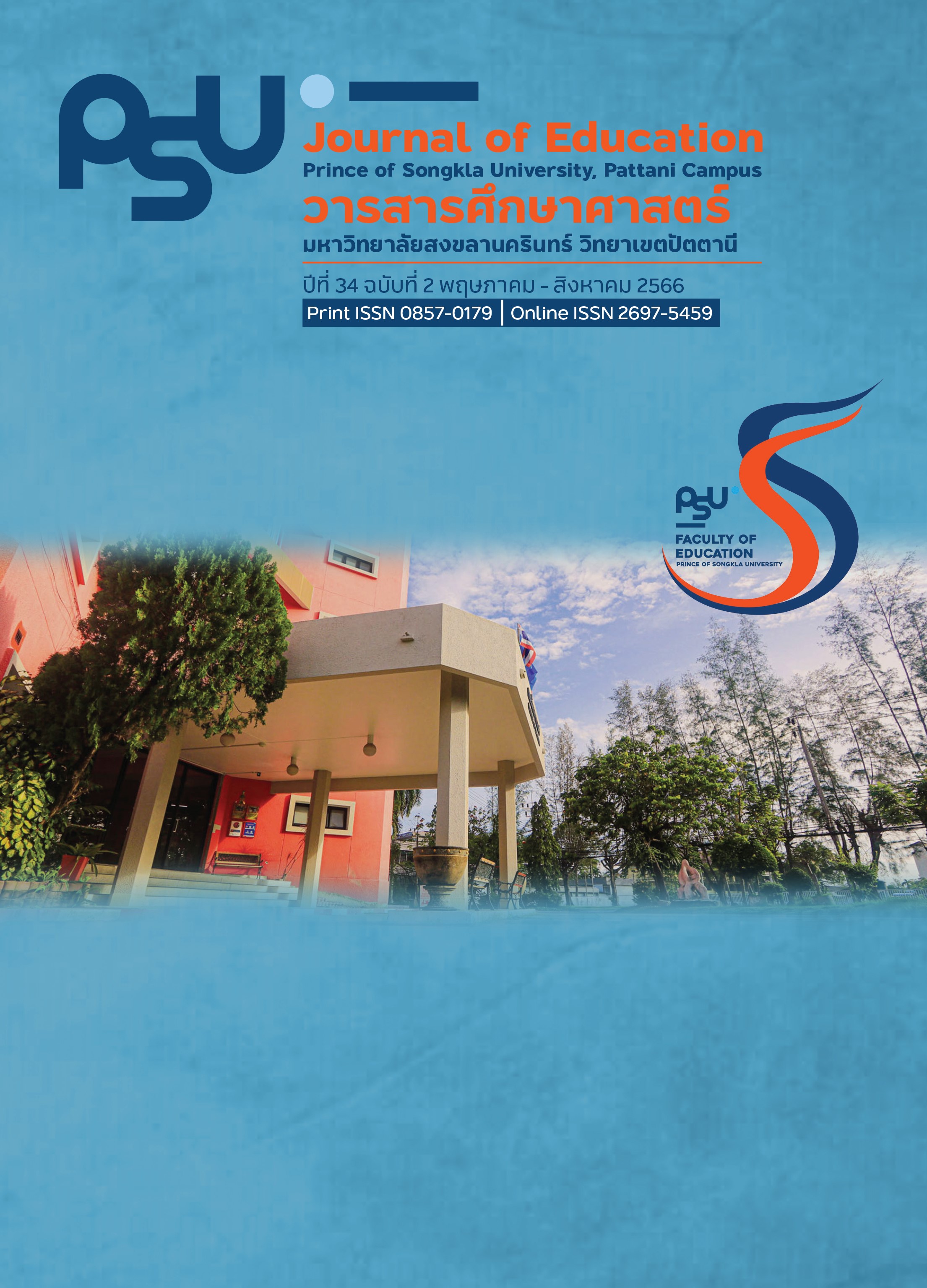การพัฒนาแนวคิดทางวิทยาศาสตร์ เรื่อง โครงสร้างอะตอม ของนักเรียนชั้นมัธยมศึกษาปีที่ 4 โดยการจัดการเรียนรู้แบบสืบเสาะร่วมกับสื่อแอนิเมชัน
Main Article Content
บทคัดย่อ
การวิจัยในครั้งนี้มีวัตถุประสงค์ เพื่อศึกษาแนวทางการพัฒนาแนวคิดทางวิทยาศาสตร์ เรื่อง โครงสร้างอะตอม โดยการจัดการเรียนรู้แบบสืบเสาะร่วมกับสื่อแอนิเมชันผ่านชุมชนแห่งการเรียนรู้ทางวิชาชีพ และค้นหาแนวปฏิบัติที่ดีในการสอน กลุ่มเป้าหมายในการศึกษา คือ นักเรียนชั้นมัธยมศึกษาปีที่ 4 จำนวน 42 คน ใช้วิธีเลือกแบบเจาะจง เครื่องมือที่ใช้ในการเก็บรวบรวมข้อมูล คือ 1) แบบวัดแนวคิดทางวิทยาศาสตร์ 2) บันทึกหลังการสอน และใบกิจกรรมของนักเรียน 3) แบบสังเกตชั้นเรียนผ่านชุมชนแห่งการเรียนรู้ทางวิชาชีพ เครื่องมือที่ใช้ในการจัดการเรียนรู้ คือ แผนการจัดการเรียนรู้ที่ร่วมกับสื่อแอนิเมชัน ผลการศึกษาพบว่า หลังเรียนรู้นักเรียนมีแนวคิดทางวิทยาศาสตร์เพิ่มขึ้นร้อยละ 58.85 และแนวปฏิบัติที่ดีของการจัดการเรียนรู้แบบสืบเสาะร่วมกับสื่อแอนิเมชันที่ช่วยพัฒนาแนวคิดทางวิทยาศาสตร์ ได้แก่ การใช้สื่อแอนิเมชันร่วมกับการใช้คำถามซักไซ้ไล่เลียงร่วมกับการฝึกอภิปราย กิจกรรมที่ใช้สมมติฐานตามทฤษฎีหรือการเชื่อมโยงสิ่งต่าง ๆ รอบตัว กิจกรรมการเรียนรู้ที่เอื้อให้นักเรียนประเมินการคิดวิเคราะห์ด้วยการใช้คำถามสร้างความสนใจและขยายความรู้ การฝึกตีความการทดลองร่วมกับสื่อแอนิเมชันออกมาเป็นภาพวาดจะนำไปสู่การนำเสนอแบบจำลองที่สอดคล้องกับวิธีการทดลอง สามารถทำให้นักเรียนให้มีแนวคิดทางวิทยาศาสตร์เพิ่มขึ้น
Article Details

อนุญาตภายใต้เงื่อนไข Creative Commons Attribution-NonCommercial 4.0 International License.
เอกสารอ้างอิง
Brown, S. & Salter, S. (2010). Analogies in science and science teaching. Advances in Psychological Education, 34(1), 167-169. http://www.advan.physiology.org/content/34/4/16
Johnstone, A. H. (1993). The development of Chemistry Teaching: A Changing Response toa Changing Demand. Journal of Chemical Education, 70(9), 701-705.
Kemmis, S., & McTaggart, R. (1988). The Action Research Planner. (3rd ed.). Geelong, Australia Deakin University Press.
Ketsing, J. (2017). Good Teaching Practices in Inquiry-based Learning for Developing 11th Grade Student's Scientific Reasoning Ability. Journal of Humanities and Social Sciences, Mahasarakham University, 36(special), 77-87. [in Thai]
Khaemanee, T. (2014). Science of teaching knowledge for effective learning process management. (18th ed). Bangkok: Chulalongkorn University Press. [in Thai]
Mingmuang, S. (2017). The Effect of Constructivist Approach Learning by Using Concept Mapping to Development to Matthayom 5 Student’s Scientific Conception of Photosynthesis. Journal of Graduate Studies in Northern Rajabhat Universities, 7(13), 139-153. [in Thai]
Ministry of Education. (2017). Indicators and Curriculum of Science and Technology (2017 revised edition) the core curriculum of basic education, B.E. 2551. Agricultural Cooperative Association of Thailand Printing House. [in Thai]
National Research Council. (2000). Inquiry and the National Science Education Standards: A Guide for Teaching add Learning. Washington D.C. National Academy Press.
Sangsutthisert, C. (2019). The Development of Scientific Conception about Ionic Bonding of 11th Grade Student's through Inquiry Based Learning Concept Mapping Combination. Journal of Social Sciences Research and Academic, Nakhon Sawan Rajabhat University, 14(3), 107-120. [in Thai]
Sombatmak, P. (2021). Development of Model Science Teacher Pedagogical Knowledge in Professional Learning Community (PLC). Journal of Teacher Professional Learning Community, 1(1), 30-44. [in Thai]
Srikhaw, N. (2014). Development of concepts and attitudes towards Chemistry on Organic Chemistry at Mathayomsuksa 5 with a search-for-knowledge teaching. Journal of Education, Prince of Songkhla University, Pattani Campus, 29(1), 107-124. [in Thai]
Supanya, P. (2018). Tenth Graders’ Scientific Argumentation Skills on Micro-Plasticand the Mae Wong Dam. (Master's thesis, Faculty of Education and Development Sciences, Kasetsart University). [in Thai]
Tranee, P. & Tawee, S. (2014). The Effect of Teaching by Learning Cycle with Cooperative Learning Technique on Science Achievement and Attitude Towards Science of 5th Grade Student's. Journal of Social Sciences Research and Academic, Nakhon Sawan Rajabhat University, 9(25), 137-150. [in Thai]
Wongsuwan, N & Siriwan, I. (2017). Participatory management. Journal of Mahachula Academic, Mahachulalongkornrajavidyalaya University, 4(1), 176-187. [in Thai]


